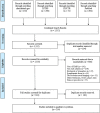A systematic review of neuropsychiatric and cognitive assessments used in clinical trials for amyotrophic lateral sclerosis
- PMID: 32910255
- PMCID: PMC8563523
- DOI: 10.1007/s00415-020-10203-z
A systematic review of neuropsychiatric and cognitive assessments used in clinical trials for amyotrophic lateral sclerosis
Abstract
Background: Up to 50% of people with amyotrophic lateral sclerosis (ALS) experience cognitive dysfunction, whilst depression and anxiety are reported in up to 44% and 33%, respectively. These symptoms impact on quality of life, and are associated with a poorer prognosis. Historically, outcomes in clinical trials have focused on the effect of candidate drugs on physical functioning.
Methods: We reviewed the past 25 years of clinical trials of investigative medicinal products in people with ALS, since the licensing of riluzole, and extracted data on frequency and type of assessment for neuropsychiatric symptoms and cognitive impairment. Trial registry databases, including WHO International Trials Registry, European Clinical Trials Register, clinicaltrials.gov, and PubMed, were systematically searched for Phase II, III or IV trials registered, completed or published between 01/01/1994 and 31/10/2019. No language restrictions were applied. Outcome measures, exclusion criteria and assessment tool used were extracted.
Results: 216 trials, investigating 26,326 people with ALS, were reviewed. 35% assessed neuropsychiatric symptoms, and 22% assessed cognition, as Exclusion Criteria or Outcome Measures. 3% (n = 6) of trials assessed neuropsychiatric symptoms as a Secondary Outcome Measure, and 4% (n = 8) assessed cognition as Outcome Measures; only one trial included assessments for both cognition and neuropsychiatric symptoms as Outcome Measures. Three ALS-specific assessments were used in six trials.
Conclusions: Trials for people with ALS have neglected the importance of neuropsychiatric symptoms and cognitive impairment. Evaluation of these extra-motor features is essential to understanding the impact of candidate drugs on all symptoms of ALS.
Propsero registration: CRD42020175612.
Keywords: Amyotrophic lateral sclerosis; Clinical trials; Cognition; Motor neuron disease; Neuropsychiatric.
© 2020. The Author(s).
Conflict of interest statement
Professor Carson is a paid editor at Journal of Neurology, Neurosurgery and Psychiatry, and gives independent testimony in Court on a range of neuropsychiatric topics.
Figures
References
-
- Johnston M, et al. Mood as a predictor of disability and survival in patients newly diagnosed with ALS/MND. Br J Health Psychol. 1999;4(2):127–136. doi: 10.1348/135910799168524. - DOI
Publication types
MeSH terms
Substances
Grants and funding
LinkOut - more resources
Full Text Sources
Medical
Miscellaneous


